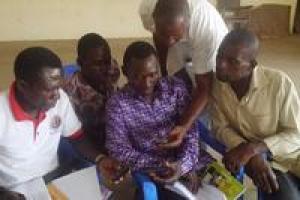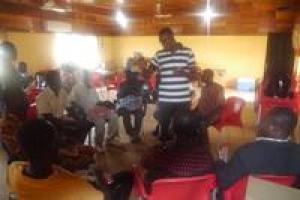Published on: 03/12/2013
Participants in the training were water facility caretakers, Water and Sanitation Management Teams (WSMT), Area Mechanics, Sunyani West District and the CWSA Regional Water and Sanitation Team.
The training workshops were held at three separate locations, namely Odumase, Chiraa and Nsoatre communities.
 These locations were chosen to facilitate easy access to the training venues, especially for people from remotely located communities. The training sessions were facilitated by staff (resource persons) from Sky Fox Limited, an Information Technology and Services company, CWSA/Triple-S and the Sunyani West District Assembly.
These locations were chosen to facilitate easy access to the training venues, especially for people from remotely located communities. The training sessions were facilitated by staff (resource persons) from Sky Fox Limited, an Information Technology and Services company, CWSA/Triple-S and the Sunyani West District Assembly.
Presentations were made on how the SMS system is expected to operate and potential contributions it could make to reducing service downtime. Series of group works were organized and participants were given the opportunity to use their own mobile phones for demonstration on how to report facility breakdown, source for spares and fill-out the log sheets indicating the various processes involved from the time of breakdown to when the facility is up and running again.
They were introduced to various stages of using their mobile phones to report on a facility breakdown and how to order spare parts.
An aged-man, Opanyin Kwesi Donkor, a facility care taker from Donkorkrom community was very grateful for the training which he said could help reduce downtime of facilities in their locality. However, his concern was that people always want to fetch for free. This has always resulted in lack of funds for maintenance and repair works on the facility. In such a situation, it will be difficult to do payments using the mobile money system. With the old system, the area mechanic could carry out the repairs and get paid at a later date when money is available. This will therefore make it difficult to fully adopt the new system.
In order to get stakeholder buy-in and inputs, a presentation on the SMS system has been held for all stakeholders involved in the project at the Sunyani West District
General Observations and challenges
As with the introduction of every new initiative there are always some challenges which could affect the success of its introduction. Some of these observations and efforts at addressing them are as follows;
- Education- the literacy levels of a majority of the people who attended the workshop was low- thus; they can’t read and write proficiently. This will affect their ability to use the SMS system. They have phones but only use them for voice calls. Other applications on the phone are barely used. There is therefore the need for a one-on-one training for this group of people for them to properly understand the SMS system before they can use the technology in any meaningful way to support the innovation. Training schedules have been made for one on-one trainings in their locality.
- No Electricity- some communities within the district are not connected to the national electricity grid. Inhabitants are therefore able to charge their phones only on market days when they travel to market centres. What happens when there is a facility breakdown but there is no way to send a text message because the phone is off due to low battery. Arrangements have however been made to provide such communities with solar chargers for their phones to solve the problem
- Limited/No Network –mobile phone network signals are either low or not available in some communities in the district. People with mobile phones may need to move to other locations where there is a network to send a text when there is a breakdown. This could be a disincentive. Alternative arrangements are being made to migrate such communities to other networks that have stronger network in those communities.
- Non-Availability of Mobile Money vendors- , there are no mobile money vendors in the local communities. This means that if there is a need for the WSMT to send money to a spare parts dealer for a purchase, they will need to travel to other business centres to be able to pay for the spare parts. Arrangements are being made to register all mobile accounts to be used for the exercise onto the mobile money platform to solve this problem
- Fears of area mechanics- some area mechanics may have the perception that the introduction of the system will affect their businesses. This could be from the fact that the area mechanics always go to assess broken down facilities and if they readily have the broken spare parts, it is used to fix the facility and the cost is charged on the community. However the introduction of the new system will deprive them of this and result in loss of revenue for them.
- Socio-Cultural factors- People will always want to travel to big towns for one reason or the other. Therefore the breaking down of a facility offers them the opportunity to do so when they are required to go and purchase the affected parts. This may therefore become an incentive for them to travel to purchase the parts rather than using the SMS system, thereby defeating the purpose for its introduction.
- Different payment systems and facility ownership- Each of the communities practice different modes of payment. Whiles some practised pay-as-you-fetched others practice a system of contribution to repair upon a breakdown. Also some faith-based organisations have created accounts schemes for facilities they constructed and sales are kept in those accounts so that whenever there is a breakdown funds are taken from those accounts, which are lodged with the organization, to carry out the repair works. If the cost of repair is more than the amount in the account, the organisation will carry out the repairs and debts are paid back later.

Conclusion:
These identified challenges are being monitored and addressed from the beginning of the project to ensure the successful implementation of the SMS system.
Compiled by Victor Narteh Otum, DCO- IRC Ghana - December 3, 2013.
 These locations were chosen to facilitate easy access to the training venues, especially for people from remotely located communities. The training sessions were facilitated by staff (resource persons) from Sky Fox Limited, an Information Technology and Services company, CWSA/Triple-S and the Sunyani West District Assembly.
These locations were chosen to facilitate easy access to the training venues, especially for people from remotely located communities. The training sessions were facilitated by staff (resource persons) from Sky Fox Limited, an Information Technology and Services company, CWSA/Triple-S and the Sunyani West District Assembly.